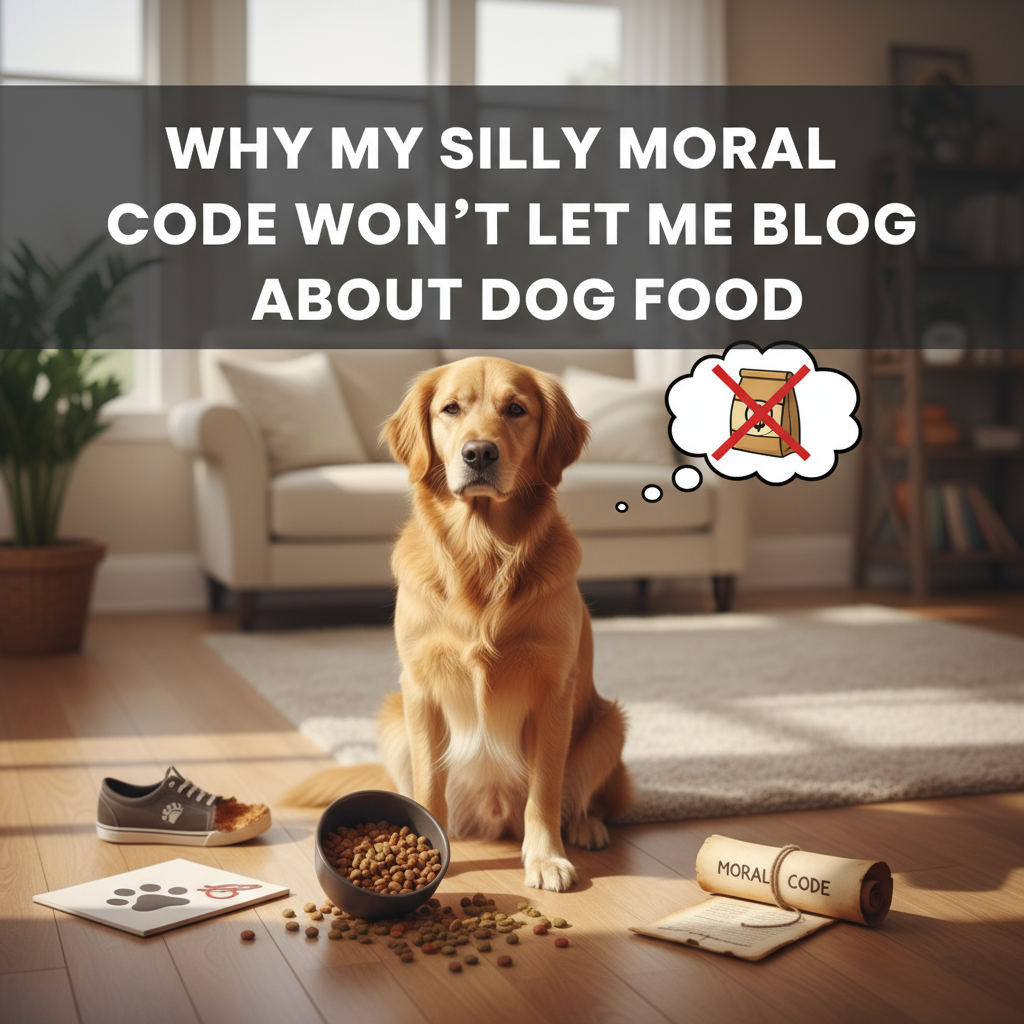Why My Silly Moral Code Won’t Let Me Blog About Dog Food
Estimated Reading Time: 5 minutes
- The ethical implications of discussing pet nutrition without expertise.
- The responsibility of pet bloggers to provide accurate, trustworthy information.
- The need for transparency and informed choices in pet food marketing.
Table of Contents
- The Importance of Knowledge in Pet Consulting
- Ethical Considerations in Pet Blogging
- The Broader Ethical Landscape of Pet Nutrition
- The Responsibility of Influencers in Pet Care
- Building a Community of Informed Choices
- Conclusion
- FAQ
The Importance of Knowledge in Pet Consulting
The hashtag, #DogFoodDebate, has been a vital part of discussions surrounding dog nutrition, but one of the most prominent voices in this conversation comes from a blogger who openly admits, “I won’t write about dog food because I lack the expertise.” This statement encapsulates a strong ethical commitment rooted in the understanding that recommending dog foods without adequate knowledge could lead to adverse effects on animal health and welfare.
Indeed, this blogger draws a powerful parallel: just as they would not advise others about children’s diets or the dietary needs of pets they do not own—like bearded dragons—they apply the same principle to dog food. Without the necessary background in canine nutrition, providing guidance on such essential matters would be irresponsible.
Ethical Considerations in Pet Blogging
The ethical discomfort surrounding dog food reviews primarily stems from a broader questioning of intent. For many bloggers, the temptation to review or endorse pet food comes from financial incentives rather than genuine expertise or experience. This approach raises critical questions about the integrity of content creators who may influence reader decisions without possessing the necessary qualifications.
Misinformation, even when unintentional, can lead to poor feeding choices that may have dire impacts on a dog’s well-being. The blogger drives home a vital point: the prevalence of dog food reviews created by non-experts in the sphere can lead to a myriad of inconsistencies and misguidance in the pet community. Such reviews, often driven by marketing strategies, add layers of complicity to ethical debates, and pet owners can be left confused, unsure whether they are making informed decisions for their pets.
The Broader Ethical Landscape of Pet Nutrition
Many voices in the industry echo these sentiments, highlighting the ethical debates regarding animal welfare and pet nutrition. Owners often face conflicts between their personal morals and the biological needs of their animals. Some dog food options, like vegan diets, while trendy, may not meet the nutritional requirements of dogs. Critics argue that promoting such diets could border on unethical, as they do not align with a dog’s fundamental dietary needs.
Transparency is another critical issue in this conversation. Misleading marketing, low-quality ingredients, and inadequate labeling can confuse pet owners who are genuinely trying to make responsible feeding choices. These factors contribute to the essential discourse around responsible pet food sourcing and production, revealing systemic flaws in the industry. Many content creators need to recognize their role in either perpetuating or alleviating these issues.
The Responsibility of Influencers in Pet Care
The engagement of bloggers in the pet nutrition discussion highlights an important concern—the influence and responsibility of online content creators. With the growing number of pet owners turning to the internet for guidance, bloggers and influencers must navigate their role carefully. When discussing products tied to health and welfare, whether for pets or humans, accuracy and ethical considerations must go hand-in-hand.
The lure of sponsorships or affiliate marketing can tempt bloggers to share their thoughts on dog foods they have not thoroughly vetted. However, fostering a loyalty built on trust rather than trendy topics will ultimately strengthen both the blogger’s reputation and the pet community’s well-being.
Building a Community of Informed Choices
For dog owners, making informed decisions about their pets’ diets requires reliable information from credible sources. In the pet consulting industry, we have a responsibility to guide clients effectively, emphasizing the importance of expertise in each area. When pet bloggers and consultants choose not to venture into discussions where they lack knowledge, they help cultivate a community anchored in authenticity and trust.
For pet consultants, this means advocating for transparency in their communication. Creating blog posts that delve into ethical sourcing, transparency in dog food production, and owner education is a powerful way to enrich the dialogue around pet health. Encouraging a partnership of knowledge between experts and pet owners can bridge gaps that misinformation has created, fostering a culture of well-informed choices.
Conclusion
The decision not to blog about dog food stems from a solid ethical stance; one that prioritizes animal health and well-being over financial gain. As pet bloggers tread the fine line between personal opinion and expertise, maintaining a commitment to responsible communication will define their credibility as industry leaders.
By adhering to a moral code that eschews unfounded recommendations, the blogging community can dismantle the prevalent trend of misleading marketing. As dog owners seek the best for their companions, they deserve accurate, expert-backed guidance that speaks to their concerns while prioritizing their pets’ health.
In a world laden with information, let’s ensure our content promotes informed decision-making rooted in genuine expertise and ethical responsibility.
For more pet care tips and guides, visit Pet Blog.
FAQ
Q: Why is it important to have expertise in dog food before blogging about it?
A: Having expertise ensures that the information shared is accurate, preventing potential harm to pets due to misinformation.
Q: What are the risks of pet food blogging without proper knowledge?
A: It can lead to poor feeding choices that might adversely affect animal health and well-being.
Q: How can pet bloggers maintain ethical standards?
A: They should only discuss subjects within their expertise and be transparent about their knowledge limitations.
